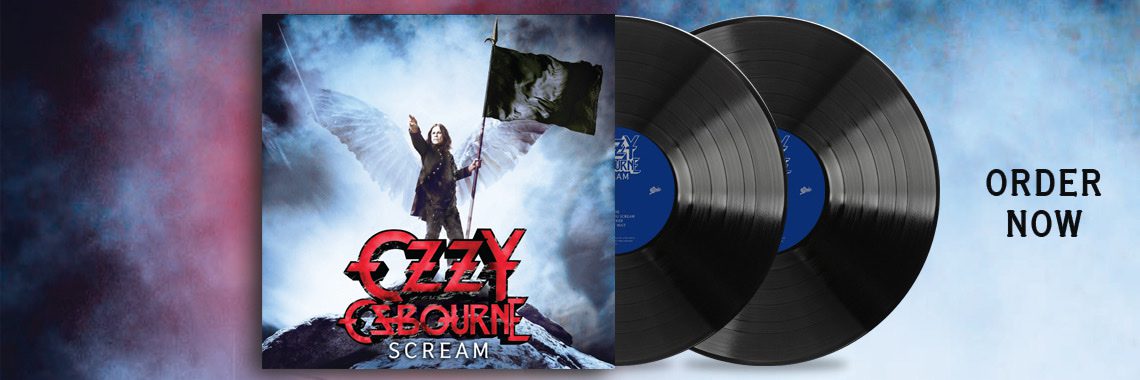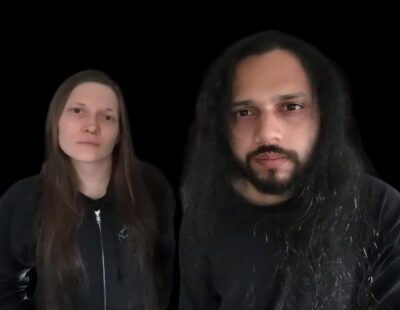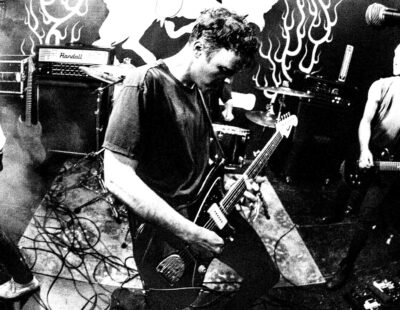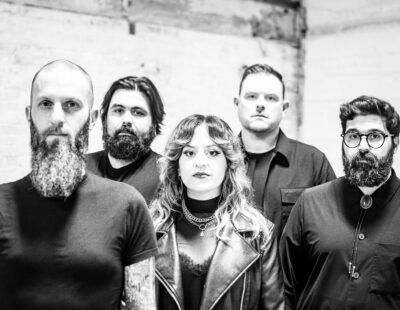Just when Gojira were about to hunker down astride the globe and chew through metal’s leather hide, spitting out those esoteric yet moshable Meshuggah-esque rhythms, riffs and that crazy squawk guitar-noise their guitars make they just disappeared. It was a bit like the dinosaurs, posing the same question: how can something so gnarly and rad and world-ruling just disappear?
Sure, they did a lot of touring. But it’s been three since The Way of All Flesh was released. That’s like eons in band years, especially when the momentum was propelling them towards something special, if not in a unit-shifting sense ‘cos no one does that, more in the sense that their sound was so unique, bold and fresh it could revive the most dessicated genre cynic. Gojira are paradigm-shifting, progressive in tempo and rhythm, with that aggression and Save the Whale ethos. The French quartet were generally accepted as one of the most exciting bands on wax and most probably the most exciting on stage.
Now signed to Roadrunner, Gojira are holed up at Spin Recording Studios in Queens, New York, tracking album number five. Having witnessed their performance at Sonisphere UK this summer, when the struggle to get into the tent near caused civil unrest, we can attest that their power has not diminished over time. Guitarist/vocalist Joe Duplantier was non-plussed about the time spent dormant but sounded pretty psyched to be back in a recording studio again. The record is as-yet untitled, and no release dates have been forthcoming. But Spring looks a reasonable bet.
It’s been a long time since your last album: why so long?
Joe Duplantier: There are no rules! It’s been three years since the last album and that was the time we needed to first of all promote our album; we did a bunch of touring, and then we had a band situation to deal with. We were changing management, changing record companies; it was a very important moment in our careers. We had to set up a new team around the band. This took us a long time, and we like to take our time to compose, like a year to create a new album.
Has your sound evolved much in that time?
JD: It’s another Gojira album [where] we have these ideas in our heads and we never know what’s going to happen. It is another album that we did with this state of mind. There’s something regular about learning from one album to another: there’s a progression but the essence is the same. I don’t think anyone will be surprised or disappointed.
I remember you telling me that you rarely listen to metal, or indeed other music when you’re working. Is that still the case or has anything caught your ear recently?
JD: We’re not like metal-heads. We come from metal; we were listening to all these American and English bands, Metallica, etc. and before that we were listening to The Beatles and Queen, and that’s where we come from. It’s the same for the other guys in the band. We are so attracted to extreme metal but when it comes to create songs we are not really listening to it. Of course, we’ll listen to heavy music sometimes when we’re on tour, But it really has to be special, really well done to catch our attention.
What is your writing process like?
JD: We gather in a room and jam. Sometimes we will have ideas or feelings of what we’re gonna do but we are always surprised what comes out of it. It’s based on jamming. Sometimes, especially Mario and me, my brother and me, we have ideas, precise ideas of something we want to do and we try it and sometimes it leads to something else. Most of the time it’s jamming. I think it is important to keep that connection with the band feeling. Back in the day, Black Sabbath, Metallica, all these bands, they were jamming; there was no other option. They could not create music on a computer in their bedroom and then show up at the practice room or the studio to record it directly. Nowadays, bands put productions together with samples, they program the drums, then they show up to the studio and everything is quantized. In a way it’s good because you are getting closer to the composition; you have an idea in your mind and you don’t depend on the performance any more you can go straight to the idea. But when you can’t play it live the fans are disappointed and let-down. ‘OK, so these guys pretend to play this music; they can’t really play it.’ It means something; it has an importance to what you are going to play on the record, and it is even more important when it is created by the members from the jamming process, from that experience and that energy. Sometimes we play and it’s really shitty; we’ve got the idea in our minds but it’s not working, and then we’ll talk about it, play again and it sounds fantastic, just because we are having a good moment together. I think you can feel this on the record we are making now.
An over-reliance on Pro-Tools can really suck, but it’s a useful tool.
JD: You can’t really avoid that these days; I mean it’s so tempting. You’ll play a part and you want to save it, you play the other part, try again and it’s better. Pro-Tools is a good tool for studios but when you create a song I think it is important to jam together.
This is the first time you’ve worked with a producer: how did that come about?
JD: I am co-producing with Josh Wilbur [Lamb of God]. I met the guy by accident in a studio we were visiting in New York. I was looking for someone to back me up on some stuff and make sure we could get our best-sounding record; I was very concerned about the sound. I was almost ready to produce it alone, like I did in the past, but this time I really wanted to work with someone who was super-professional, with high quality sound. He also had some stuff to say on songs, like, “This part, I feel it is too short; you guys could do something better.” At first Mario [Duplantier, drums] and I were like, wait a minute—nobody ever told us what to do with our songs—but he encouraged us to go further, to experiment. And that makes him a good producer; he’s trying to get the best out of us.
It’s good to get a fresh pair of ears.
JD: We know what we want, exactly, but we feel strongly enough to say no. Even sound-wise, if he wants us to play with a certain cymbal, try a certain snare: but we know what to keep so that we have our signature sound but what he suggested was very intelligent, very smart, appropriate: for example one cymbal on the drum-kit was changed because it wasn’t matching the other crash cymbal. That was his recommendation and, wow, he was so right on that. It’s hard to explain to the fans what a producer is and even for us it’s a little confusing but somehow it works quite well with Josh.
https://youtu.be/_Gv7fo6mefo
Can you tell us any titles?
JD: Not yet. I have ideas on it, and everything will come together at some point—I hope! Haha. No, I’m working on it at the moment so I don’t have any working title; it’s a very interesting moment, it’s like when you have a baby but you haven’t given a name to it yet, it’s just something alive, there’s no identity. That’s the case for us at the moment. We have the songs. We have the ideas, but I can’t gave you any names.
How far along are you with it?
JD: We’ve just recorded the drums and I’m on the guitars right now. We still need to record the bass and the vocals.
So you’re still in the States at the moment, then?
JD: Yeah, I’m in New York City! It’s going great; I am really loving being here. A lot of people working around the band are in New York so it makes sense to stay here, and I can meet them… There’s a great energy here. The communication with people here is really straight—it’s incredible! We can move fast, I dunno, I wanted to be here to do the album; it brings a lot of energy.
Is that NYC intensity going to find its way onto the record?
JD: Yeah, absolutely, it adds to the sound, definitely, and to the energy when I play, and I get to meet a lot of people, different musicians. It is very inspiring. We live in the countryside in France and we like it that way because we are close to the mountains and the forest and the ocean—we live in a beautiful area. But I am going to stay here for a while because it’s good to get a change sometimes, get in the big city and meet some people.






